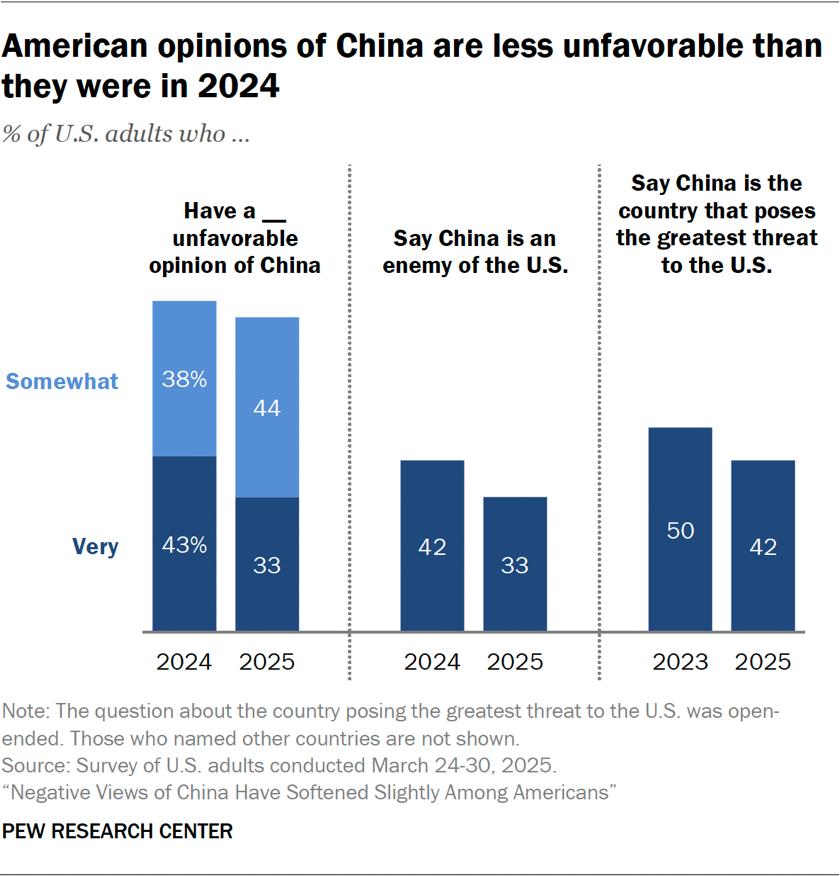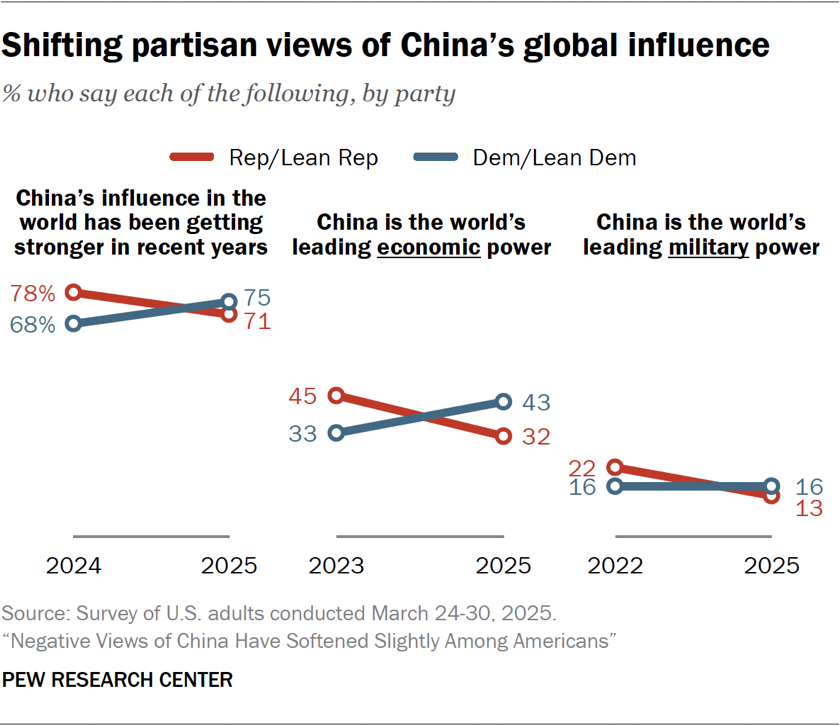
Americans hold largely negative views of China: Most have a very or somewhat unfavorable view of the country, and they tend to name China as the nation that poses the greatest threat to the United States.

Still, attitudes toward China have warmed somewhat. For the first time in five years, the share of Americans with an unfavorable opinion of China has fallen from the year before – albeit slightly, from 81% in 2024 to 77% in 2025. And the share who have a very unfavorable opinion of China has dropped 10 percentage points since last year.
The share of Americans who call China an enemy of the U.S., rather than a partner or a competitor, has also fallen. One-third now hold this view, down from 42% last year.
Still, when asked which country poses the greatest threat to the U.S., Americans mention China more often than any other nation (42%). But the share who name China has fallen 8 points since 2023, when we last asked this question.
These are among the findings of a Pew Research Center survey conducted March 24-30, 2025, among 3,605 U.S. adults. The survey took place amid escalating economic tensions between the U.S. and China, caused in part by rapidly shifting tariff policies:
- Before the survey was fielded, U.S. President Donald Trump imposed additional tariffs on China in February and again in early March.
- After the survey concluded, Trump announced sweeping tariffs on many countries, including further tariffs on China, in April.
- China also implemented new tariffs on the U.S., both before and after the survey was fielded.
Views by party
Negative attitudes toward China have softened among Republicans and Republican-leaning independents, though they continue to be more critical of the country than Democrats and Democratic leaners. The share of Republicans with an unfavorable view of China is down 8 points since 2024, including a 16-point drop in the share with a very unfavorable view. In comparison, unfavorable views among Democrats saw a 5-point decline.
Republicans are 14 points less likely than they were in 2024 to label China an enemy of the U.S. Since we first began asking this question in 2021, Republicans have generally been more likely to call China an enemy than a competitor, but they are now equally likely to use each label. Among Democrats, the share who consider China an enemy has fallen 6 points since last year.
For their part, Democrats have become less likely to name China as the country posing the greatest threat to the U.S. – 28% say this is the case, down from 40% in 2023. Republicans saw a more muted change in that time (-5 points). For Democrats, much of this change relates to an increasing share naming Russia as the top threat to the U.S.
For more on U.S. views of Russia, read “Republican Opinion Shifts on Russia-Ukraine War.”
There have also been pronounced changes from previous years in partisan assessments of China’s international influence:

- In 2024, Republicans were 10 points more likely than Democrats to say China’s global influence was growing. Now, adults in both parties are equally likely to hold this view.
- While Republicans used to be more inclined than Democrats to label China the world’s top economic and military power, Democrats are now more likely to hold these views.
Views on trade and tariffs
Americans do not think the trade relationship between the U.S. and China is balanced. Nearly half (46%) say China benefits more from U.S.-China trade, though a quarter say both countries benefit equally; 10% think the U.S. benefits more.

A majority of Republicans say China benefits more from the U.S.-China trade relationship. Democrats are divided between the view that both countries benefit equally and the view that China benefits more.
We asked the same questions about U.S. trade with Canada and Mexico. Americans consider the U.S.-China trade relationship more unbalanced than the others: 26% of Americans say Canada benefits more than the U.S. from their trade relationship, and 29% say this in Mexico’s case.
Americans are largely skeptical about the effects of increased tariffs on China. About half say these tariffs will be bad for the U.S., and a similar share say the tariffs will be bad for them personally.
Among Democrats, 80% think the tariffs will harm the country, and 75% believe these measures will harm them personally. Republicans are more optimistic. While only 17% say increased tariffs on China will be good for them personally, they are more inclined to say the tariffs will be good than bad for the country (44% vs. 24%).
Related: Americans Give Early Trump Foreign Policy Actions Mixed or Negative Reviews
Guide to this report
- Chapter 1: U.S. views of China and Xi
- Chapter 2: Views of China’s role in the world
- Chapter 3: Views of trade between China and the U.S.
- Chapter 4: Views of China as a competitor and threat to the U.S.




